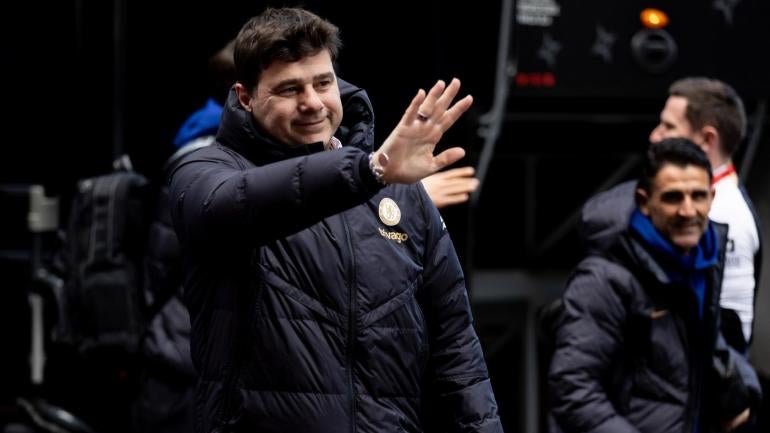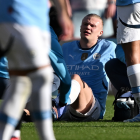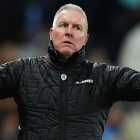
When U.S. Soccer fired Gregg Berhalter in July after the U.S. men's national team crashed out of the group stages of the Copa America, the federation essentially made a big promise to the fanbase -- it would land a high-caliber replacement ahead of the 2026 World Cup, one that would match the importance many have placed on a competition on home soil.
Landing such a candidate, though, was uncharted territory for the USMNT. The national team has almost exclusively been led by those with experience in the domestic game, and though that does not necessarily hinder the team's success, most felt like a fresh set of eyes was needed to reboot the program after the Copa America failure. Just as they did with the game-changing hiring of Emma Hayes to lead the women's national team last fall, U.S. Soccer are close to working with the most high-profile option available to them as they reportedly near the finish line on welcoming Mauricio Pochettino as the head coach of the USMNT. The federation's board of directors is yet to approve the move and neither party has yet signed a contract, but the fact that Pochettino is the finalist for the job is a strong signal that U.S. Soccer is determined to deliver on their ambitious promise.
Though it was initially unclear which direction U.S. Soccer would go in, Pochettino feels like a good fit for multiple reasons. He boasts an impressive résumé with plenty of Premier League experience at Southampton, Tottenham Hotspur and Chelsea, while mixing in a spell coaching Kylian Mbappe, Lionel Messi and Neymar at Paris Saint-Germain. Pochettino is well-known for a pressing, attack-minded style of play that, at its best, makes his team an entertaining watch. Most impressively, though, he is familiar with the task of coaching a team to punch above their weight -- his Tottenham team reached the 2019 Champions League final and finished as runners-up in the 2016-17 Premier League season.
Pochettino seems poised to deliver much of what the USMNT have been missing since the 2022 World Cup, a period of time in which the group has made little progress. On days the U.S. were supposed to dominate, they frequently struggled to get by; not only did they fail to reach their potential, they were unable to live up to their very realistic expectations. His ability to deliver an entertaining and effective tactical approach is an aspirational way to combat the USMNT's recent plateau and perhaps lay the groundwork for the memorable World Cup performance the federation has long targeted.
The Argentine, though, also feels like a strong candidate as it pertains to the intangibles that make or break any team. Pochettino assembled a young but hungry squad at the start of his five-year spell at Tottenham, with the likes of Harry Kane and Son Heung-min enjoying their breakout seasons under his leadership. He convinced them not only of his style of play and his ambitions but created an ideal team environment before leading them to four Champions League finishes in five years.
"With him, it's always about hard work and belief," Kane said after a 1-1 draw at Barcelona in December 2018, four years after Pochettino's arrival and a few short months before they played in the Champions League final. "That's what he said to us before the game and at half time: just believe, bring energy, work. And we'll get the reward. You just want to perform for him, work hard for him, win for him. He's very passionate. You can tell sometimes he wants to be out there himself, putting in tackles, running about. You respond to that. On nights like that, big occasions, you just want to do him justice. We're buzzing, he was very happy in the changing room."
"Hard work" is not just an expression from Kane, either. Pochettino was known in his early days at Tottenham for intense double sessions during preseason and made a point of listing players who did -- and did not -- demonstrate a strong work ethic in "Brave New World", the 2017 book written by Guillem Balague. It would mark quite a change of pace from Berhalter, who some argue created an environment of comfort in recent months, leading veteran defender Tim Ream to reflect that "the intensity falls through the cracks" shortly after their earlier-than-anticipated Copa America exit. From Pochettino's perspective, it will help that some players are eager to do the work -- World Cup captain Tyler Adams argued recently that the USMNT "need someone that's almost a little bit ruthless coming in and putting everyone in their place."
Pochettino's ability to speak Spanish is also a huge plus. The USMNT have not had a head coach who could speak the language at a high level since Steve Sampson, who was in charge from 1995 to 1998, despite the fact that there are several Spanish speakers in the wider player pool. While much of the USMNT's current core group is fluent in English, the combination of Pochettino's résumé and his fluency in both languages will no doubt be a strength as U.S. Soccer continues to recruit players who are eligible to represent multiple national teams.
Just like any hire, though, there are still several questions to be answered ahead of a new era for the USMNT. Chief among them is Pochettino's adjustment to the international game -- despite being linked with the Argentina national job in the past, he has only ever coached at the club level, and a high-pressing style of play can sometimes be difficult to instill when a coach only works them so intermittently. He has also never demonstrated an expertise in the American soccer landscape unlike USWNT counterpart Hayes, who began her career at the lower levels of women's soccer in the U.S. before building her profile in her native England.
The second issue may be a survivable one, especially if Pochettino's focus is on the 2026 World Cup since much of the USMNT's player pool is based in Europe, where he currently lives and plans to remain if he takes the job, per ESPN. The first, though, is related to the big, existential question that has faced the USMNT since Berhalter was tasked with reviving the program in 2019: Exactly how high is this team's ceiling?
This group's potential has been clear as soon as the previous generation of players failed to qualify for the 2018 World Cup, and optimism was at an all-time high after their round of 16 exit at the 2022 World Cup. This version of the USMNT was expected to mature in the buildup to 2026 and establish themselves as a mighty minnow on the international stage, but have yet to do so. Their Copa America failure has rightfully forced questions of the collective group's ability to pull off a statement-making performance at the World Cup in two years' time, though there is still plenty of time on the clock to reverse course.
Pochettino's impending high-profile arrival is undoubtedly a best-case scenario for the aspirational USMNT -- after all, hiring a talented coach is a strong strategy to take an underdog team to the next level. His hire, though, also means there are few excuses left on the table if the players cannot live up to the hype and that, one way or another, we may finally discover how talented this group actually is.
![[object Object] Logo](https://sportshub.cbsistatic.com/i/2020/04/22/e9ceb731-8b3f-4c60-98fe-090ab66a2997/screen-shot-2020-04-22-at-11-04-56-am.png)

















